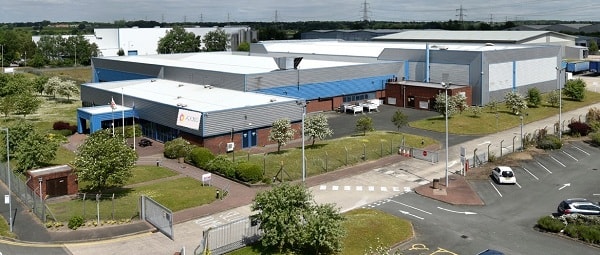Production of new anti-cancer drugs at ADC Bio’s North Wales manufacturing plant has been boosted following completion of a new cleanroom facility, designed and built by WHP.
This forms a key part of ADC Bio’s construction of a new bioconjugation facility at its site in Deeside, North Wales, UK for the commercial production of antibody drug conjugates in response to global customer demand.
Antibody drug conjugates are a class of emerging biotherapeutics that require a bespoke infrastructure to ensure strict compliance with the highest global regulatory standards.
WHP, the multi-disciplinary engineering company, was awarded the £5m contract in December 2017, and the new facility – which includes support areas for washing, depyrogenation, thawing and buffer preparation – sees drug manufacturing in a stringently controlled environment, operated under cGMP regulations. This eliminates any risks during antibody modification and conjugation that could support the development of environmentally-borne microbial contaminants.
WHP’s scope of work covered the design and build, including test and validation of a state-of-the-art containment manufacturing cleanroom within an existing 6,500 sq. m high tech facility, along with new quality control and process development laboratories.
Auto-cad design work encompassed cleanroom architecture, M&E components and process and critical utilities systems. Also featuring complex zoned HVAC systems to maintain segregation, cleanliness, air pressures, and other environmental controls, the cleanroom facilities have been developed in compliance with MHRA regulations.
A key feature of the project has been the installation of a bespoke low maintenance toxic waste system, developed by WHP to remove cleanroom waste to a holding tank, where it is transported to an off-site incinerator. This system incorporates dry break couplers to seal off both ends of the pipeline to prevent the possibility of any onsite contamination.

Charlie Johnson, CEO at ADC Bio, said: “We are building a best in class facility to the highest possible global standards. We awarded the contract to WHP on the back of its relevant industry experience and reputation for delivering cost-effective, single source cleanroom design and build packages.
“It’s a facility we are extremely proud of that will help our customers develop vital new medicines for patients globally.”
WHP’s project manager, Chris Douglas, said: “The new cleanroom meets ADC Bio’s need to expand operations at Deeside beyond R&D to include safe, secure and highly efficient manufacturing capabilities.
“This latest project reflects growing success in delivering high quality cleanroom technologies across the pharmaceutical sector, providing customers with expertise, knowledge and one-stop-shop solutions.”
More details at www.whp-engineering.com/
About WHP
WHP is a multi-disciplinary engineering company dedicated to providing both standalone and turnkey solutions for cleanroom and manufacturing processes across Europe. The company’s comprehensive services range from design, project management, engineering, validation and fabrication, to full commissioning of new installations.
About ADC Bio
ADC Bio is an innovative biotechnology company developing new process technology to speed, simplify and significantly lower the production costs of the latest generation of anti-cancer blockbuster drugs, Antibody Drug Conjugates (ADCs). Formed in 2010, the Company has commercialised and expanded facilities at St Asaph, Denbighshire into an international centre of expertise in the manufacture of ADCs. As specialists in state-of-the-art bio-conjugation techniques and cytotoxin drug-linker synthesis, the Company offers technical services to assist drug developers to deliver next generation ADCs and other biomolecule conjugates. ADC Bio’s proprietary ‘Lock-Release’ technology aims to become a new paradigm in the way ADCs are developed and manufactured, increasing accessibility for patients by helping to contain ADC production complexity and cost. ‘Lock-Release’ technology results in fast, simple and robust conjugation processes, with the potential to eliminate several process steps whilst enhancing product quality.

















![Sirio Launches Global Research Institute for Longevity Studies [SIA]](https://www.worldpharmatoday.com/wp-content/uploads/2019/09/Sirio-218x150.jpg)

